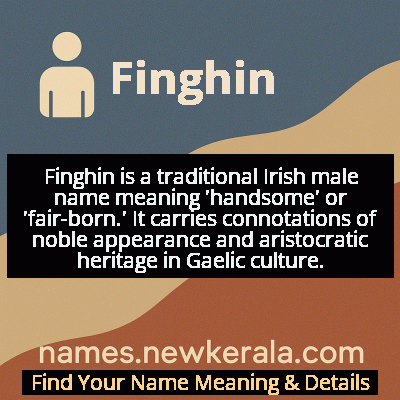Finghin Name Meaning & Details
Origin, Popularity, Numerology Analysis & Name Meaning of Finghin
Discover the origin, meaning, and cultural significance of the name FINGHIN. Delve into its historical roots and explore the lasting impact it has had on communities and traditions.
Name
Finghin
Gender
Male
Origin
Irish
Lucky Number
4
Meaning of the Name - Finghin
Finghin is a traditional Irish male name meaning 'handsome' or 'fair-born.' It carries connotations of noble appearance and aristocratic heritage in Gaelic culture.
Finghin - Complete Numerology Analysis
Your Numerology Number
Based on Pythagorean Numerology System
Ruling Planet
Uranus (Rahu)
Positive Nature
Strong sense of order, loyal, practical, and disciplined.
Negative Traits
Stubborn, overly serious, rigid, and prone to feeling restricted.
Lucky Colours
Blue, gray.
Lucky Days
Saturday.
Lucky Stones
Blue sapphire.
Harmony Numbers
1, 7, 8.
Best Suited Professions
Managers, engineers, accountants, organizers.
What People Like About You
Dependability, discipline, practicality.
Famous People Named Finghin
Finghin Mac Carthaigh
King of Desmond
Founded the MacCarthy Reagh dynasty and ruled Munster
Finghin of Munster
Irish Prince
Prominent figure in 7th century Munster royal succession
Finghin O'Mahony
Gaelic Lord
Resisted English expansion in 16th century Munster
Name Variations & International Equivalents
Click on blue names to explore their detailed meanings. Gray names with will be available soon.
Cultural & Historical Significance
The name's persistence through centuries reflects its deep roots in Gaelic aristocracy and resistance to cultural assimilation. During the Norman invasion and subsequent English rule, bearers of the name often represented the old Gaelic order, maintaining Irish traditions and language. The name's association with handsome appearance in its meaning also connects to the Celtic ideal of physical beauty being linked to noble character and leadership qualities.
Extended Personality Analysis
Individuals named Finghin are often perceived as possessing natural leadership qualities combined with charismatic presence. The name's meaning of 'handsome' extends beyond physical appearance to suggest someone with graceful demeanor, diplomatic skills, and the ability to command respect through both presence and intellect. They tend to be traditional yet innovative, honoring their heritage while adapting to modern circumstances.
Finghins typically exhibit strong loyalty to family and community, reflecting the name's historical association with clan leadership. They often demonstrate resilience in facing challenges and maintain a dignified composure under pressure. Their personality blends the poetic sensitivity of Celtic tradition with practical wisdom, making them effective mediators and respected figures in their social circles. The historical weight of the name often inspires bearers to pursue excellence and maintain high personal standards.
Modern Usage & Popularity
In contemporary Ireland, Finghin remains a distinctive but uncommon choice, primarily used by families with strong connections to Irish heritage or specific regional ties to Munster. While not among the most popular names, it has seen a modest revival as part of the broader Celtic naming trend. The name is most frequently encountered in Irish-speaking communities (Gaeltacht areas) and among families seeking to preserve traditional Gaelic names. Its usage outside Ireland is rare but occasionally appears in Irish diaspora communities, particularly in the United States, Canada, and Australia where families maintain strong Irish cultural connections.
Symbolic & Spiritual Meanings
Finghin symbolizes the enduring legacy of Gaelic nobility and cultural preservation. The name represents the ideal of leadership combined with aesthetic grace, where physical beauty reflects inner nobility of character. It carries connotations of resilience and cultural continuity, embodying the survival of Irish identity through centuries of political and social change. Symbolically, Finghin connects bearers to the ancient concept of 'rígfhéinnid' - the warrior-poet king who combined martial prowess with cultural refinement. The name also represents the bridge between ancient Celtic traditions and modern Irish identity, serving as a living connection to Ireland's royal past while adapting to contemporary society.

